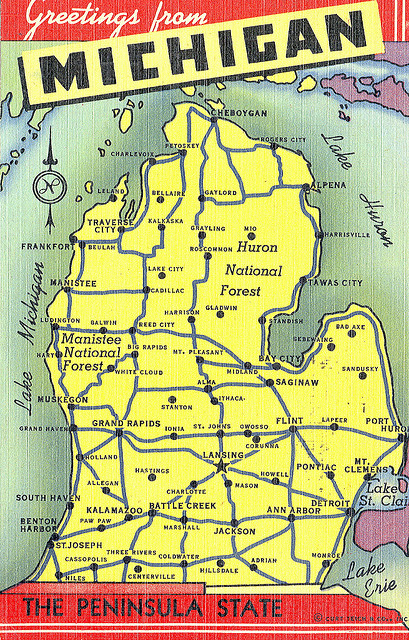Proposed changes to Michigan’s environmental rules will eliminate red tape and redundancy, but environmental groups say air, water, soil and health protections will be weakened.
In January Michigan officials tasked with creating a business-friendly environment proposed 77 recommendations to Gov. Rick Snyder to overhaul environmental regulations. Snyder denied three of them. The Legislature will have to approve the rest before they go into effect.

Photo: UpNorth Memories - Donald (Don) Harrison (Flickr)
A 13-member advisory committee of state officials, industry and utility representatives, lawyers and one environmental group worked with the state’s Office of Regulatory Reinvention on the report.
Some changes, like recycling manufacturing waste and eliminating duplicative efforts, pose no environmental harm. Others will deregulate some air pollutants and toxic emissions.
“I dissented on changes that I thought reduced the state’s role of protecting public health,” said James Clift, policy director at the Michigan Environmental Council and lone representative of the environmental community on the advisory committee.
He disagreed with 20 of the changes. No one else dissented.
Some changes are a step backwards, Clift said. Chemicals not on the federal list of hazardous pollutants will no longer be subject to testing.
“Michigan has for years been a leader in protecting people from toxic air pollution — so much so that other states have adopted our standards,” Clift said. “And now we’re pulling back.”
Another change will exempt electric generators that don’t sell to the grid from air quality rules.
These tend to be smaller, industrial boilers that can be coal-fired just like utilities, Clift said.
“They have the same impact on public health and air pollution,” Clift said. “All facilities should be on the table.”
Industry and utility representatives lauded the changes.
“The real meaningful changes are more process related than actual requirements,” said Skiles Boyd, vice president of environmental management and resources at DTE Energy and participant in the advisory committee. “Some of the processes we go through are too burdensome to get the result that we already know we’re going to get.”
Environmental cleanup and air toxics emissions needed the overhaul, Boyd said.
Cleanups were actually slowed by rules.
“If we can cut red tape, you reduce risk tremendously,” Boyd said. “You can move through the actual cleanup much faster instead of waiting around for years to start.”
Changes include shifting some duties to other state departments and eliminating rules that are no longer relevant.
The state’s air toxic emissions requirements were written before federal rules, Boyd said. Since there are now nationwide rules, there is duplication.
Snyder rejected proposed elimination of local regulations of wetlands, the cutting of mandatory submission of pollutant spill plans and the exclusion of wetland impacts when considering pollution permits.
The state is already moving forward with the remaining recommendations, said Rob Nederhood, deputy director of the Office of Regulatory Reinvention. The changes are subject to public comment and will have to be approved by the Legislature, he said.
The department anticipates some pushback from environmental organizations, Nederhood said. “No one was there to gut environmental regulations.”
Boyd said the committee members challenged each other when it seemed a proposed change could hurt the environment.
Nederhood said there are changes that will benefit everyone, like increased transparency spurred by a recommendation that forces the Department of Environmental Quality to put online any information the agency might use to make decisions.
Another change will force the state to develop a beneficial reuse act, which will be a template for recycling manufacturing waste that is now trashed.
Clift said the environmental community would continue to object to changes with which it disagreed.
“We’re done with the actual committee process, but as each of these regulatory changes moves through, we will continue to engage with both officials and industry leaders,” Clift said.
Snyder created the Office of Regulatory Reinvention within the Department of Licensing and Regulatory Affairs to create an environment “conducive to business growth and job creation,” according to an April 2011 executive order.
Since April 25, 2011, the agency has removed 47 state environmental quality rules, not counting the 74 pending changes. For all state departments it has removed 415 rules and added 56.